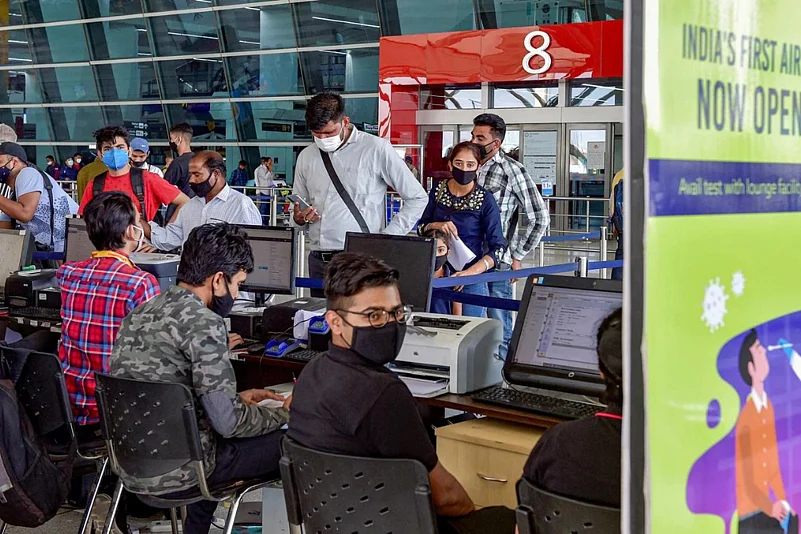The latest variant of Covid-19 emerging from South Africa, named Omicron by the World Health Organisation, was first reported on November 9, 2021. Within 20 days, it has spread to more than 12 countries.
Its high infectivity and multiple mutations have alarmed the whole world and every country is now trying to keep itself safe by taking measures to stop its entry.
As of now, it has not been reported in India and like many other countries, the Indian government has also taken certain steps and reviewed the existing guidelines for international arrivals.
Experts agree that ensuring proper diagnosis and quarantine of infected international travellers upon arrival is essential for preventing them from becoming sources for an Omicron outbreak in India.
Outlook spoke to experts to find out five steps that can be taken by countries to further defend themselves against Omicron.
Mandatory risk profiling of each individual
Public Health experts believe that health care workers and airport or port staff need to be extremely vigilant of every individual arriving at these entry points and ensure through profiling.
Airlines also have to play a proactive role at the point from where the flight is originating so that any person who is suspected of being infected by the new variant cannot board the flight.
“According to the new government norms for international arrivals, every person who is coming from risk countries has to undergo an RTPCR test. However, those who are not from 'at risk' countries don’t need to do so,” a public health expert working with the government, tells Outlook on the condition of anonymity.
“I think RTPCR test should be made compulsory for every arrival irrespective of the country an individual is coming from because you never know in how many countries the virus has spread today. Every day, a new country is being added to the list of risk countries," he adds.
Institutional quarantine should be a must
According to the new government-revised norms, every individual coming from risk countries have to follow a 7-day home quarantine norm even if his RTPCR report is negative. Those who are found to be positive will be treated separately in accordance with standard protocol.
Infectious disease expert Dr Ishwarprasad Gilada, however, opines that institutional quarantine should be made mandatory for every person coming from abroad as home quarantine is often not observed strictly.
“Today, it is very difficult to identify the risk country as every passing day we are finding cases in different countries. I think the government should amend the rule and make the provision of institutional quarantine mandatory for everyone,” he said.
Many experts say that the RTPCR test is accurate in only 60 to 70 per cent of cases and it cannot detect the virus in 30 per cent cases. Hence, institutional quarantine should be advisable for everyone.
Genome sequencing of samples
The revised government norm, to come into force from December 1, 2021, says that samples of those travellers who are found to be positive should be sent for genome testing.
Public health experts have welcomed the move and said that this will help in identifying the new variant but they say that this should be implemented with immediate effect.
Aggressive contact tracing of suspects
If a traveller is found to be positive on the arrival, it is important to trace fellow travellers. While the government has set up protocols for contact tracing, ground-level implementation is poor. Many public health specialists say that the health care workers or the administrative staff engaged in the work of contact tracing need to take their job more seriously.
“I am proposing institutional quarantine for everyone because we know that once an infected person leaves the airport, he or she will create hundreds of touchpoints and it will be really impossible to sanitise everything. The new variant is already highly infectious and once it spreads, it is nearly impossible to contain it later,” Dr Gilada says.
Strict observance of appropriate Covid-appropriate behaviour
Many travellers at airports have stopped following appropriate Covid-19 behaviour. During peak hours, social distancing goes for a toss and many travellers don’t wear masks properly.
Prof (Dr) Jugal Kishore, Head of Community Medicine, Vardhman Mahavir Medical College & Safdarjung Hospital says that strict Covid protocol is very important to contain the spread of any Covid-19 strain and advises every individual to follow it. “It is very important to understand that masking and maintaining social distancing should be the first step towards protection," Kishore says.
















